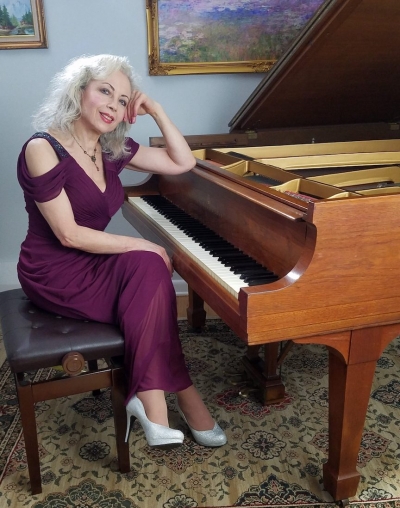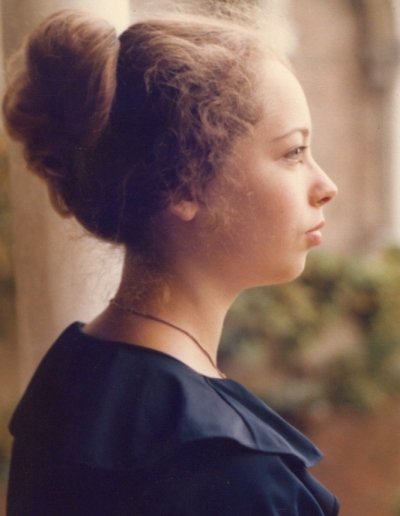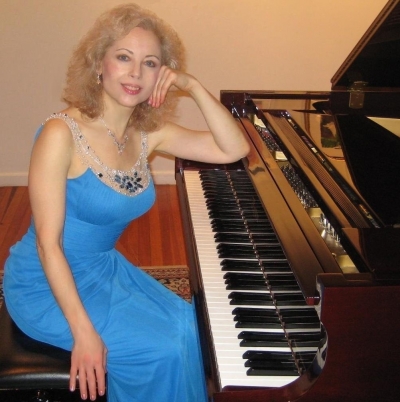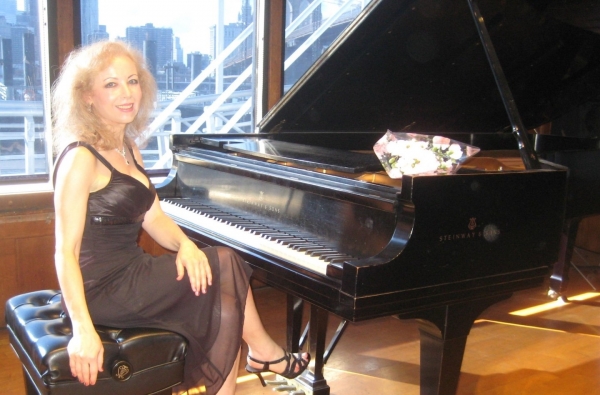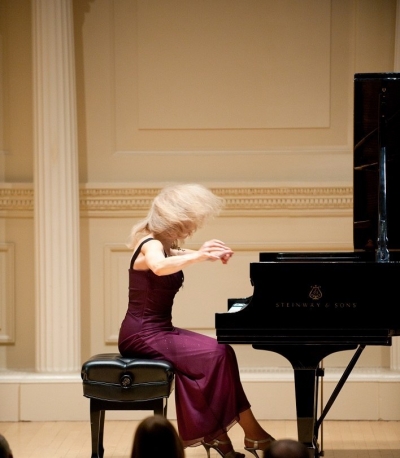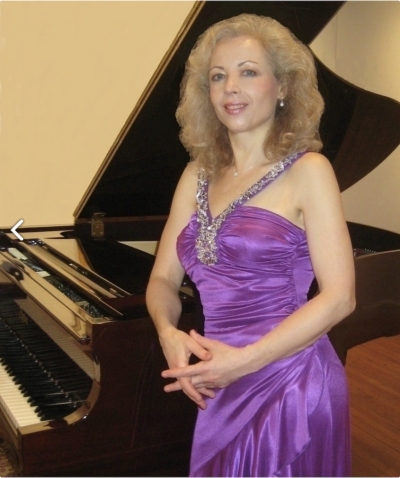I have been very pleasantly surprised over the past few years that several classical pianists have reached out to me to review their music. Sophia Agranovich is one such artist, and I was thrilled when she asked about doing an interview. Sophia's life has taken some really interesting twists and turns. Born and raised in Ukraine, she came to the US as a teen to attend Juilliard. Her story is fascinating, and I think you'll enjoy getting to know Sophia as much as I have! We did this interview via email in July 2021.
KP: Greetings from the west coast to the east coast! How are you, Sophia?
SA: Hello, Kathy, and thank you for the invitation to interview! I am doing great.
So happy the grip of COVID-19 on the world is finally weakening!
KP: Yes! and I really hope it continues to do so!
You recently released Beethoven: In Celebration of 250th Anniversary of His Birth, which I really enjoyed. How did you choose which of Beethoven's pieces to record? There are so many!
SA: Named ‘the father of the Romantic era’, Beethoven in his compositions was breaking the boundaries of Classical forms, pointing to the new artistic trends of the expressive style of Romanticism. I selected all-time favorite piano masterpieces that illustrate how Beethoven departs farther and farther from established tradition: Sonatas No.8 in C minor Op. 13 ‘Pathetique’, No. 14 in C♯ minor ‘Quasi una fantasia’ Op. 27 No. 2 ‘Moonlight’, and No. 17 in D minor Op. 31 No. 2 'The Tempest'. All of these Sonatas have original structures, harmonies, texture, thematic ideas and Beethoven’s unique expression of stormy passion and drama, brooding meditation, deep despair, sublime poetry and exalted joy. I also chose a Fantasia in G minor/B Major, Op. 77 – a rare gem that I recently fell in love with, although it's not well-known. It imitates Beethoven’s legendary improvisations and is written in an unusual form with constant changes of key, tempo and style, expressing nuances of feelings with great liberty, unconventional contrasts, unusual outbursts of sound, and true romantic flavor.
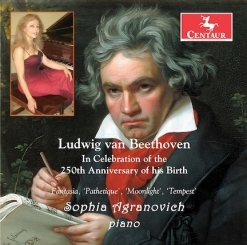
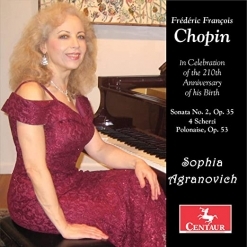
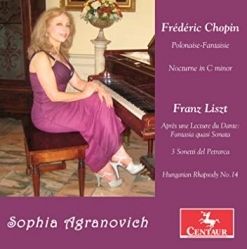
Click on album covers to
go to Kathy's reviews.
KP: I have reviewed three of your albums so far: the Beethoven Celebration (2021), Frédéric François Chopin (2020) and Chopin and Liszt: Piano Works (2018). How many other albums have you recorded?
SA: Six more. In total – nine albums in the past eleven years. I try to capture some of the most exquisite pieces of piano repertoire that are very demanding musically and technically. They are as follows:
-Romantic Virtuoso Masterpieces (works by Beethoven, Chopin, Liszt, Schumann, Scriabin - 2010)
-Franz Liszt - Bicentennial Tribute (‘Un Sospiro’, ‘La Campanella’, Rhapsodie Espagnole, Sonata in b minor - 2012)
-Passion and Fantasy (Beethoven: ‘Appassionata’, Chopin: Fantaisie and Sonata in b minor - 2014)
-Brahms-Paganini Variations books I and II, Schumann: Symphonic Etudes, Schumann-Liszt: ‘Widmung’ – 2014
-Schubert: ‘Wanderer’ Fantasie and Chopin: 4 Ballades – 2015
-Schumann: Carnaval and Fantasie – 2016
-Chopin: Polonaise-Fantaisie and Nocturne Op. 48 No.1, Liszt: 3 Sonnetti del Petrarca, ‘Dante’ Sonata, Hungarian Rhapsody No. 14 – 2018
-Chopin: Sonata in B-flat Minor, 4 Scherzi, Polonaise ‘Héroïque’ – 2020,
and this latest Beethoven album.
KP: That's a huge amount of music to perfect!
Let's talk about your early life and then come back to the present. Where are you from and where did you grow up?
SA: I was born in Ukraine, which was a republic of the Soviet Union at a time, in a quaintly beautiful city Chernivtsi, nicknamed ‘Paris and Vienna in miniature’.
KP: When did you discover the piano?
SA: I fell in love with the piano after attending a recital of Sviatoslav Richter when I turned five. Under his unique touch, the piano sounded like many other instruments - and as rich as an orchestra. I felt you could express anything you want on this special instrument.
KP: And you can! Do you come from a musical family?
SA: Since my early childhood, I was constantly exposed to art, theatre, literature, poetry, ballet and especially music: in the concerts, on the radio and TV, and with the extensive LP record collection of my parents.
My father loved music, but was more scientifically oriented. My mother was an English teacher and a translator, and an overall erudite. In addition to her native Russian and Ukrainian, she knew English, German, and French, wrote poetry in English and Russian, was a talented artist and a connoisseur of music, art and literature. She taught me how to read at three, and started taking me to concerts, opera, and ballet since I was four. She had a beautiful soprano voice, and often sang opera arias and popular songs at home. I loved classical literature, and later – science books. I also enjoyed drawing and painting, going to theatre, gymnastics, running, and swimming. In school I loved math, science and literature, but my dream was to be a ballet dancer.
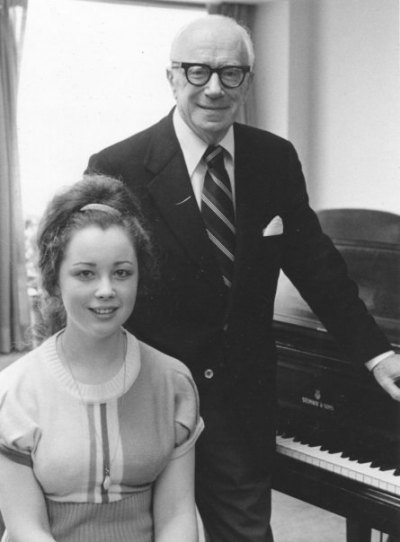
Juilliard School - with professor Sascha Gorodnitzki at his studio, May 1975
KP: When did you start playing the piano?
SA: We had a piano at home, which I was playing by ear. My mother taught me the basics until I started taking lessons with a professional music teacher at the age of five and entered Chernivtsi Music School. I was very fortunate to have outstanding teachers, Anna Stolyarevich and Alexander Eidelman, who were among the best in Ukraine. Both of them had studied with Heinrich Neuhaus in Moscow and were peers of Vladimir Horowitz at Kiev Conservatory in the class of Felix Blumenfeld. After emigrating to United States, I studied at the Juilliard School with legendary Professors Sascha Gorodnitzki and Nadia Reisenberg.
KP: I've read that you started performing in piano competitions at a very young age. Tell us about that.
SA: When I was ten, being the youngest participant, I won the First place in the Ukrainian Young Artists Competition. In the final round I performed Concerto in E minor by Chopin in Kiev. I also had played in a lot of recitals, which were broadcast nationwide, since I was six.
KP: That's amazing!
When did you come to the United States?
SA: I came to United States with my family at fifteen.
KP: How long were you a student at Juilliard?
SA: At Juilliard I studied 1 year in the Pre-College division, 4 years - getting a Bachelor of Music Degree, and 1 year – Master of Music Degree, all on a full scholarship. After that, I was awarded a Fellowship and taught Piano Minor at Juilliard.
KP: Who and/or what inspired you to pursue a career in music?
SA: Studying music and piano came easily to me. For example, I was playing all of the Chopin Etudes by the age of twelve. But I was interested in many other subjects. My parents were very old-fashioned, and I was brought up with the idea that a woman should dedicate herself to her family and avoid professions with traveling. So, I didn’t plan to be a concert pianist. Just before I was leaving for the U.S., my teachers urged me to apply to Juilliard. To me it seemed quite far-fetched, but I auditioned anyway, and was accepted as a student of Professor Sascha Gorodnitzki, Piano faculty chairman—an honor indeed, especially since he made a rare exception by taking me as a pre-college student. So, ‘my fate was sealed’.
KP: Who and/or what has had the biggest influence on you and your music?
SA: At early age, my mother exerted a strong influence on my appreciation of music and art. Later in life, I was influenced by my outstanding teachers, great pianists, instrumentalists and singers. I also find inspiration in theatre, opera, ballet, visual arts, literature and poetry.
KP: Are there specific pianists who have inspired you?
SA: Yes, definitely. My teachers--Gorodnitzki and Reisenberg; also Schnabel, Cortot, Cziffra, Serkin, Perahia, Ashkenzy, Argerich, Kissin… I heard live a lot of the old school pianists, and admired their interpretations of particular composers. For example: Richter in Beethoven, Schumann, Prokofiev; Oborin in Tchaikovsky; Rubinstein and Davidovich in Chopin (of course); Gilels, in everything he played(!); Horowitz—even if I disagreed with some of his interpretations, to me he is one of the most exciting and interesting pianists. And many more… The list is long!
KP: What did you do after you earned your Master's Degree?
SA: I continued studies towards a Doctorate at the Columbia University Teachers College, but deferred that pursuit to raise a family. I worked 23 years in Computer Technology, the last 7 years of which as a VP/Project Manager. I actually loved everything about computers and was constantly exploring new languages and platforms. As a manager, I enjoyed working with people, but couldn’t deal well with office politics. What kept me sane and balanced was my practicing piano almost every day, even if it was only 20 minutes. Often I was so tired that I played with closed eyes, especially after resolving nightly production problems in my company. Somehow I never lost hope that I’d come back full-time to music, although it seemed so unrealistic then.
KP: That's a really amazing shift - from classical music to computers! When did you come back to music full time?
SA: When my children were grown, I went on to concertize and teach, resuming my musical career. I also received certifications in various Holistic Healing disciplines, Life Coaching, as well as Yoga and Pilates, which I had taught for 2 years at the local YMCA.
KP: Is there anything you haven't done or tried? Wow!
Do you think women who aspire to become concert pianists - especially in the classical realm - have an easier time being accepted and taken seriously now than you did as a younger person?
SA: I think so. Women are getting closer to breaking ‘a glass ceiling’, but there is still work to do. My women colleagues and I did experience unfair treatment in the corporate world as well.
KP: No doubt! I did, too. That's why I wanted to be my own boss.
Did you run up against much prejudice in your early career? Do you think you had to work harder than your male counterparts?
SA: In my music career, I personally experienced less prejudice than while working at the brokerage company, especially when I became a manager. Unruly competitiveness and office politics were even more disruptive.
KP: And unfair. Were you able to spend much time practicing while you were raising your family?
SA: Marriage, children, and caring for family members often change our priorities… It is known that maintaining a good family life while pursuing a musical career is notoriously challenging, if not impossible, especially if extensive travel is involved. And there was the financial aspect to consider. I consulted with my teachers, Sascha Gorodnitzki and Nadia Reisenberg, on what to do. They independently gave me the same advice: “practice daily as much as you can, no matter what, and never lose hope!”
At that time I was very curious about computer technology, so I took courses and found that I absolutely loved them. But, I never imagined staying in that field for more than a year or two. To my surprise, after getting a job, I quickly became the main bread-winner for my family. So, during all of that 23 years, I practiced the piano at home almost every day after work, even if only for 15-20 minutes, following the advice of my teachers.
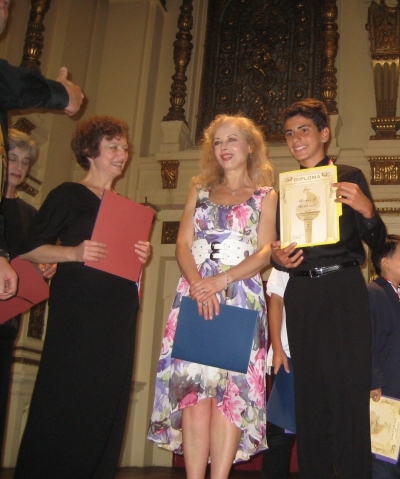
Awards at Ehrbar Hall, Vienna
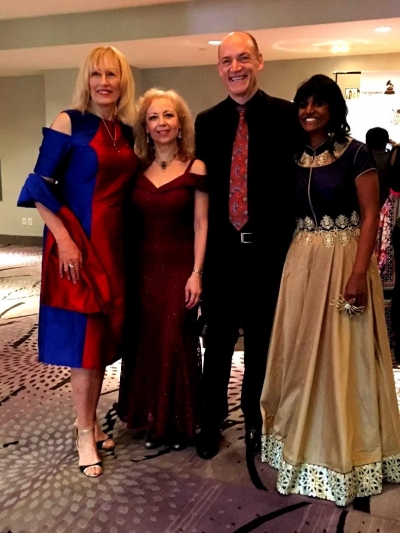
At the 60th Grammy Awards with Darlene Koldenhoven, Wouter Kellerman and Tholsi Pilay. 2017
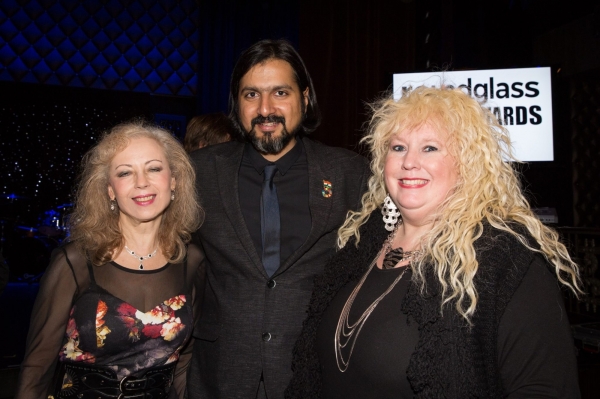
With Ricky Kej and Monique Grimme.2017
KP: You are also very well-known as a teacher. Did you teach your children to play the piano?
SA: Yes, I did try, and they played for a number of years. They were quite talented, but I had hard time making them listen to me – a problem known to many teachers.
KP: Definitely! That reminds me of something I wanted to ask you. I recently retired after 40 years of teaching piano privately. I found that over the course of that many years, it became more and more difficult to keep students engaged with piano lessons. Early on, my biggest competitor for practice time with students was the local swim teams, but then the electronics started creeping in - virtual pets, pagers, game consoles, and then the cell phones. Working at anything for ten years or more seemed to be beyond most students' comprehension. What do you do to keep students engaged? Or do you only accept students who are already genuinely interested in the piano?
SA: I accept all students, provided they are serious and willing to practice hard. Most of them keep being motivated as the time goes by. I assign them a required repertoire from all the music styles, and I play the pieces for them, letting them choose what they prefer. They actually like to practice assigned scales, exercises and etudes, because they see how their technique is improving and how much easier it is to perform. I encourage them to play in recitals and competitions, which makes them practice more and value their achievements. If they somehow lose their motivation, I talk to them and /or their parents to find the cause. And then – it is much easier to make them interested again. I often assign them pieces that echo their moods and feelings, and then they see music as their special therapy. I explain why music is so important in life.
KP: What are the most important elements of making music that you want to pass on to your students and the next generation?
SA: I teach my students to sincerely express in music thoughts and emotions, balancing them with composers’ intentions out a fear of being criticized. To achieve this, it is important to practice technique, learning musical theory and history, reading about composers and general artistic and philosophical trends at the time they lived to better understand their sphere and influences. Sight reading, improvising, and trying to compose is important in developing creative imagination. It is all about projecting indescribable magic in performance, which is achieved with hard work and love. I strive to inspire my students to feel music in their souls, appreciate its wonderful gifts, and connect spiritually with composers. As Beethoven said, ‘Music is … A higher revelation than all Wisdom and Philosophy’.
KP: It sounds like you are working mostly with students who aspire to become professional concert pianists. Is that correct?
SA: A lot of them do, and some had become professional musicians. But most of them and their parents realize that to be a performing pianist is quite impractical. They enter colleges and universities with another major in mind, and take music as a minor or double-major. But almost all of them continue playing and even giving private piano lessons.
KP: You have been nicknamed "The Tigress of the Piano." How did you develop your fiery approach to playing the instrument?
SA: It is natural. I don’t aspire to do anything unusual; just reproducing what I feel without fear of being wrong. I subdue myself to become a medium for the music. I am trying to produce energy, feelings and thoughts of a composer and atmosphere of the piece. What is interesting, while playing, I feel a change in my own personality, like a possession. I push it to the limit until I almost have an out-of-body experience. Being able to do this requires a lot of technical preparation and analysis.
KP: That's really fascinating! Is it difficult to summon up a lot of passion for music that you've played over and over?
SA: No! I have never practiced much due to the circumstances, so I hear pieces in a fresh way. In the familiar compositions, I love to discover new nuances, sound colors and structures.
KP: You have mentioned that Professor Sascha Gorodnitzki said that if such legends as Emil Gilels, Arthur Rubinstein and Sviatoslav Richter entered modern piano competitions, they wouldn’t win. Why? Do you agree?
SA: Paradoxically, Gorodnitzki’s students kept winning the largest number of awards in major international competitions, yet he himself told me that if judges were blindfolded and heard Gilels, Richter, Rubinstein or other legends, they wouldn’t award them any prizes.
In competitions, musical expression is just one part of the adjudication. Real artistry, however, is all about projecting magic, as Gorodnitzki used to say. Of course, technique is needed for that, but it is only a means to an end. Individuality is hard to assess ‘correctly’ and it depends on the judge’s taste. Music is not a horse race. While at Juilliard, I decided not to enter any more competitions.
KP: Do you feel that competitions are a good thing?
SA: I do selectively prepare my own students to enter some competitions as long as it gives them an incentive to practice more, feedback from the judges, performance opportunities, and doesn’t interfere with their overall musical progress.
KP: It does seem like striving for technical perfection can kill or at least subdue true artistry.
Which composers' music do you enjoy playing the most?
SA: I was exposed to all the music genres, and don’t have any preferences if the music is masterly done and the expression appeals to the heart! However, I am more often in the mood for and best in the interpretation of the music of Romantic era (Schumann, Schubert, Liszt, Chopin, Brahms, Mendelssohn, Russian composers, and more), but I also love Bach, Mozart, Beethoven, Debussy, Stravinsky, Prokofiev, Shostakovich, and other 20th century and some living contemporary composers. Too many to list here!
I actually think it is easier to play contemporary music. It is culturally closer to us. In a way, traditional repertoire is more challenging: it is a competition against generations of great musicians! But I love that music so much, I don’t care about comparison! Composers that are further in time from us are more refined, intriguing and challenging, in my opinion. It makes me “transport” to another lifetime.
KP: Are you planning to start performing live concerts again soon?
SA: Yes, and looking forward to it so very much!
KP: What are you working on now and do you have any future projects planned?
SA: I am working on a number of new pieces and planning to learn new repertoire to fit different concert programs in live recitals and at least 4 new albums.
KP: What has been your most exciting musical moment so far?
SA: It is hard to tell… many times – abandonment and a feeling of levitation while performing, or dissolving in pure poetry when practicing late at night, or listening to great musicians, or opera, or watching a movie with an outstanding score…
KP: Are you strictly a classical musician or do you branch out into some of the other music genres as well?
SA: I do improvise in different styles and play by ear, but not publicly. I also teach some of my students different musical styles and composition.
KP: Who are some of your favorite musical artists?
SA: So hard to choose… Great opera singers, conductors. violinists, cellists, flutists, and, of course, pianists. Too many to mention here!
KP: If you could have any three wishes, what would they be?
SA: Peace, Love and Harmony in the World.
KP: Is there anything else you'd like to talk about?
SA: I believe that love, beauty, truth and music can help in healing the world. Communication, healthy discussion and listening to other opinions without prejudice are of the utmost importance. History repeats itself. Don’t follow the slogan "Who is not with us is against us.” Try not to make the same mistakes! During the pandemic I also experienced a real power of positive thinking, gratitude, and music that inspires, supports and heals!
KP: Thanks so much for taking the time to share your fascinating life and careers with us, Sophia!
For more information about Sophia Agranovich, be sure to visit
her website and her
Artist Page here on MainlyPiano.com.
Kathy Parsons
July 2021

